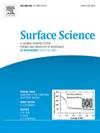Ethanol dehydrogenation and autocatalytic dehydration on oxidized Cu(111)
IF 1.8
4区 化学
Q3 CHEMISTRY, PHYSICAL
引用次数: 0
Abstract
Exploring the formation of valuable chemical feedstocks from renewable sources is critical for decreasing global dependence on fossil fuels. The decomposition of ethanol forms acetaldehyde, a solvent and precursor for dyes, pesticides, pharmaceuticals and more; ethylene, which is crucial for the plastics industry; and clean hydrogen, a necessity for all hydrogenation reactions. While it is well known that Cu(111) and oxidized Cu(111) catalyze the dehydrogenation of small primary alcohols to form aldehydes, dehydration products to form alkenes are less discussed. An in depth study of the reactivity of ethanol on O/Cu(111) shows dehydrogenation, dehydration, and combustion products using temperature programmed reaction spectroscopy (TPRS). The presence of oxygen on O/Cu(111) resulted predominantly in acetaldehyde formation via the dehydrogenation pathway, with lesser amounts of ethylene via dehydration, as well as combustion products. Successive TPRS experiments resulted in decreased yields of all products due to the consumption of surface oxygen via water formation <200 K. Isotopic studies of ethanol–OD indicate the role of the hydroxyl hydrogen in water formation from Oads compared to water that desorbs during dehydration, as well as hydrogen formation via the dehydrogenation pathway. The dehydration pathway is proposed to occur via autocatalytic production of Oads during the ethoxy transformation to ethylene, furthering the reaction to form ethylene and CO2.

氧化Cu(111)的乙醇脱氢和自催化脱水
探索从可再生资源中形成有价值的化学原料对于减少全球对化石燃料的依赖至关重要。乙醇的分解形成乙醛,它是染料、杀虫剂、药品等的溶剂和前体;对塑料工业至关重要的乙烯;干净的氢,是所有氢化反应的必需品。众所周知,Cu(111)和氧化Cu(111)能催化小伯醇脱氢生成醛,但对脱水产物生成烯烃的讨论较少。一项对乙醇在O/Cu(111)上的反应活性的深入研究显示了脱氢、脱水和燃烧产物,使用温度程序反应光谱(TPRS)。氧在O/Cu(111)上的存在主要导致通过脱氢途径形成乙醛,通过脱水和燃烧产物产生较少数量的乙烯。连续的TPRS实验导致所有产品的产率下降,因为水形成消耗了表面氧<;200 K。乙醇- od的同位素研究表明,与脱水过程中解吸的水相比,羟基氢在Oads中形成水的作用,以及通过脱氢途径形成氢的作用。脱水途径是在乙氧基转化为乙烯的过程中,通过自催化产生Oads,进一步促进形成乙烯和CO2的反应。
本文章由计算机程序翻译,如有差异,请以英文原文为准。
求助全文
约1分钟内获得全文
求助全文
来源期刊

Surface Science
化学-物理:凝聚态物理
CiteScore
3.30
自引率
5.30%
发文量
137
审稿时长
25 days
期刊介绍:
Surface Science is devoted to elucidating the fundamental aspects of chemistry and physics occurring at a wide range of surfaces and interfaces and to disseminating this knowledge fast. The journal welcomes a broad spectrum of topics, including but not limited to:
• model systems (e.g. in Ultra High Vacuum) under well-controlled reactive conditions
• nanoscale science and engineering, including manipulation of matter at the atomic/molecular scale and assembly phenomena
• reactivity of surfaces as related to various applied areas including heterogeneous catalysis, chemistry at electrified interfaces, and semiconductors functionalization
• phenomena at interfaces relevant to energy storage and conversion, and fuels production and utilization
• surface reactivity for environmental protection and pollution remediation
• interactions at surfaces of soft matter, including polymers and biomaterials.
Both experimental and theoretical work, including modeling, is within the scope of the journal. Work published in Surface Science reaches a wide readership, from chemistry and physics to biology and materials science and engineering, providing an excellent forum for cross-fertilization of ideas and broad dissemination of scientific discoveries.
 求助内容:
求助内容: 应助结果提醒方式:
应助结果提醒方式:


